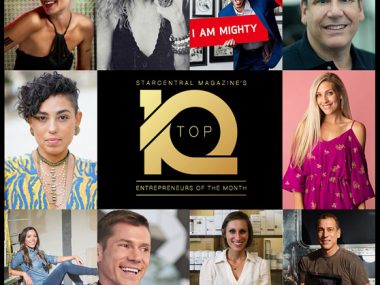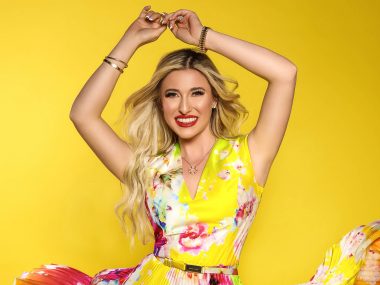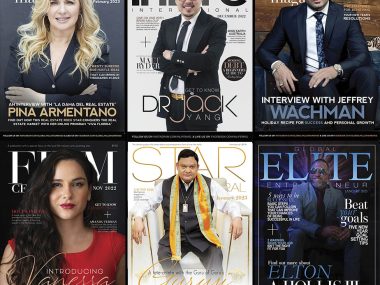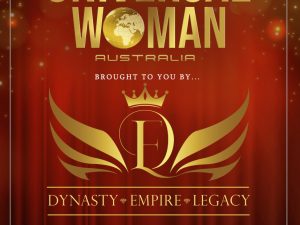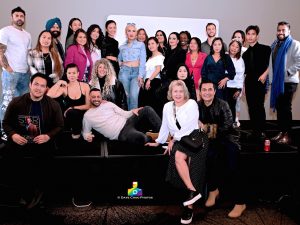Kyle Hunter aka K. Sparks is not your average musician. He has released over 1,000 songs and 40 albums, he has toured globally, and he also happens to be the CEO of Rhythm Couture – a company that brings diversity and ownership to music licensing.
His accomplishments range from sold-out shows in Europe, and his music has been featured in the 50 Cent hit series Power on the STARZ Network, Les Mills, Monster Energy, The New York Times, and countless others – you would think he’d be a household name. But you probably haven’t heard of him, and that’s just the way he prefers it.
His company, Rhythm Couture, was co-founded with his business partner and co-owner Robert Ronci. The company’s primary service is to provide custom music for television, movies, and corporate advertising, and its roster consists of over 25 musicians on a global scale ranging from Taiwan, Mexico, Hong Kong, The United States, as well as other countries.
His journey is all the more impressive given its humble beginnings; it all started at Queens New York’s notorious South Ozone Park. He was an independent musician before becoming a businessman. He started his label, “Double Up Entertainment,” by releasing several mixtapes and painstakingly selling them hand to hand from the trunk of his car. “Back then I had a Mitsubishi Galant. Driving around New York with my street team selling music.” Since then he’s amassed millions of streams, snagged major commercial placements such as Powerade featuring Lebron James, collaborated with Kanye West artist Kid Cudi as well as nominated for Best Hip Hop Record against recording artist Wiz Khalifa.
Eventually, he realized that he should actually build his own company from the ground up rather than promote someone else’s work. He recorded and amassed a music catalog of over 1,000 songs, ensuring that he owned the rights to all master recordings and publishing. “Ownership is critical. Artists lose when they don’t own their masters. That’s a musician’s retirement plan.” From that point on, he leveraged his catalog to infiltrate television, movies, and mainstream media outlets. Utilizing direct revenue from his earnings to fund his company Rhythm Couture.
Besides running a successful business, he has also stressed the importance of going back to your roots and inspiring others. “Every generation should have more than the last. Giving back is imperative.” Some of his philanthropic work includes giving back to the Boys & Girls Club within his hometown and speaking to at-risk youth.
StarCentral Magazine recently caught up with the inspirational K. Sparks to discuss his journey within the music industry and here’s what went down:
How did you get started in the music industry? How were you actually ’discovered’?
I grew up in Queens, New York, and I was raised by my parents. My mother was a graduate of Harvard University, and an educator for the New York City Board of Education. My father was a member of the United States Air-force who later went on to become a successful businessman. Growing up, I started creating music and distributing it independently. Those independent releases eventually gained significant traction and I ended up catching the attention of major record labels. Eventually, I ended up collaborating with high-profile musicians such as Kanye West artist KiD CuDi, Rapsody, Nick Cannon, and various others. From that point on, I began generating radio play on major radio stations and receiving recognition in major publications. I was later signed by a music agent to create custom music for TV and film. After receiving hundreds of successful placements within the television and film industry, I branched out and formulated Rhythm Couture.
What prompted you to start your music licensing company?
I realized that when it comes to music licensing, the content is diverse, but ownership is not. The wealth gap between minorities and other races is disparaging. I started music licensing back in 2009 and I eventually realized I had to change the narrative. Growing up in inner-city communities, minority children often view rappers and athletes as being successful. However, there should be a shift in the mental state towards ownership. The coach may last longer than the player, but it’s the owner who lasts the longest.
What do you like most about making music?
Music is therapeutic. It provides an outlet that allows me to translate all of my emotions. Regardless if they are positive, negative, or indifferent.
What inspires you to be creative?
Life. That pretty much sets the tone for my creative content. I’ve experienced a lot of things and traveled to many places. Having so many experiences shapes and molds various creative concepts. I’ve experienced many highs and many low points, but cumulatively, they are what defines my creative process.
What message, if any, do you usually try to put into your work?
My music is what I like to regard as “life” music. So essentially I’m discussing the realities that life is never perfect, and it’s always a journey to obtain happiness. My life is an open book so I’m happy to discuss everything. Anyone that listens to my content knows that I never hold back. I’ve seen my mother get diagnosed with breast cancer, and watched her physically wither away to the point that she died in front of me in a hospital bed. Then, a few years later, I received a distressing telephone call informing me that my brother’s dead body was found in a hotel room in Queens New York. I had to go down to the morgue to identify his body and that period was extremely dark. It just felt like everything was falling apart and negative. I shut down at that point in my life and shut a lot of people out. Although the shocking ordeal made me put things into perspective, such as what’s important, and what’s not, it was still very dark times. It took a lot for me to come out of that, but fast forward to a few years later and a lot has changed. I’ve become very successful financially, but then money can never bring back the people I lost. So the message in all of this is that “persistence wears down resistance.” Life will challenge you, but never let it break you because you owe it to yourself to become better.
Do you feel that you chose your “passion,” or did it choose you?
I did not choose my passion. It chose me. Music is innate, and it’s in my DNA. Music is something that I’ve done my entire life. It’s something that resonates with me in many ways, but most importantly because it allows me to connect with people.
Can you tell us more about Rhythm Couture? How did you come up with the concept for this company?
When initially forming Rhythm Couture, myself and my business partner Robert had several business discussions in regards to changing the landscape of musical licensing. Prior to Rhythm Couture, we observed that lots of the music distributed by sync companies were just generic stock music. Being musicians ourselves, we felt that it would be impactful to form a company that has curated high-quality content. So the focal point has always been very straight forward, to provide the broadest and most eclectic catalog featuring the highest caliber musicians and par none music production. The Rhythm Couture brand exceeds expectations delivering on our creative commitment to marry the message and the music: “Rhythm Couture – when your message and the music really matters.”
What are you currently doing to maintain/grow your business?
We are currently in the process of forming a partnership and expanding with other major companies. I can’t disclose the details as of yet, but within the next few months, we will make an official announcement.
What social media platforms do you usually use to increase your brand’s awareness?
We currently utilize common social media outlets such as Instagram, Facebook, Youtube, etc. However, recently I’ve become turned off by Facebook and their platforms. My company recently attempted to purchase a promotional campaign for an article I wrote discussing social injustice, and the need for equality within the music business. We eventually received a message from Facebook stating that we would not be permitted to purchase advertising because the content was deemed something “that could have an impact on the upcoming election.” It was strange and it struck a negative chord with me. Any company that refuses to allow companies to discuss equality because they are concerned about politics is clearly in bed with the wrong politicians.
What is the toughest decision you had to make in the last few months?
Balancing our company’s budget is always challenging. The focal point is to ensure that we are allocating funds where they are most effective. Marketing plays a large part in that, so essentially determining where to allocate those funds to be most effective. It can be hit or miss, but it’s an ongoing learning process.
What money mistakes have you made along the way that others can learn from (or something you’d do differently)?
I’ve made some bad investments. I lost thousands by investing in companies that performed poorly. But I never regret anything because life is a teacher. You always get the test first, then the lesson.
What new business would you love to start?
A not-for-profit organization that helps underprivileged inner-city youth. Assistance provided would be things such as business development, and financial literacy. Providing education and opportunity is the key.
If you could go back in a time machine to the time when you were just getting started, what would you do differently?
Nothing. That would have a direct impact on where I am at today. Everything happened the way it was supposed to happen.
What is the best advice you have ever been given?
“Don’t get burned trying to keep other people warm.” In life, you will meet two kinds of people, those that are genuinely in your corner, and those that are merely takers. The genuine people will always be there for you, anytime you need them, for any situation. But on the flip side, the takers always show their hand, and the patterns are there. They only call when they need something, such as money, or to emotionally drain you with nonsense. Ultimately you have to choose you, and put yourself first. Compartmentalize those relationships, and choose those that choose you.
What advice would you give to a newbie talent who wants to make it in the music industry?
Persistence wears down resistance. Work hard, keep the faith, and everything will come together.

